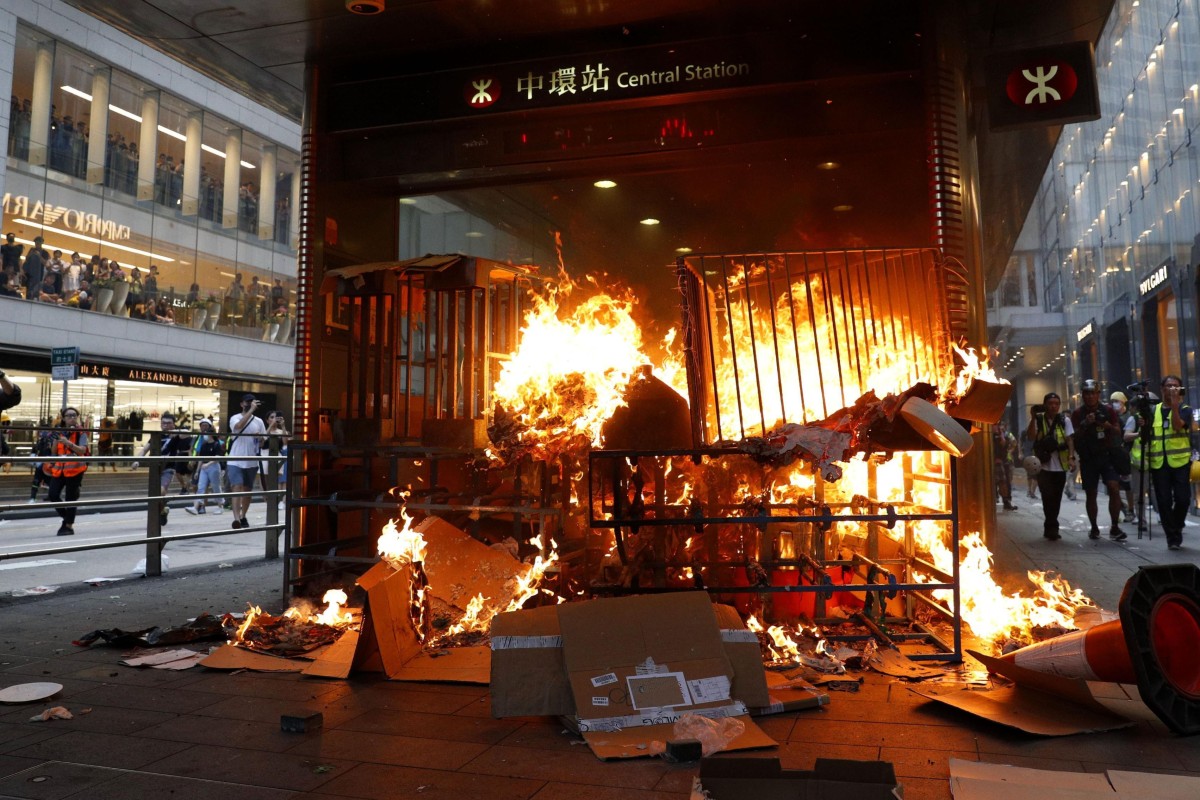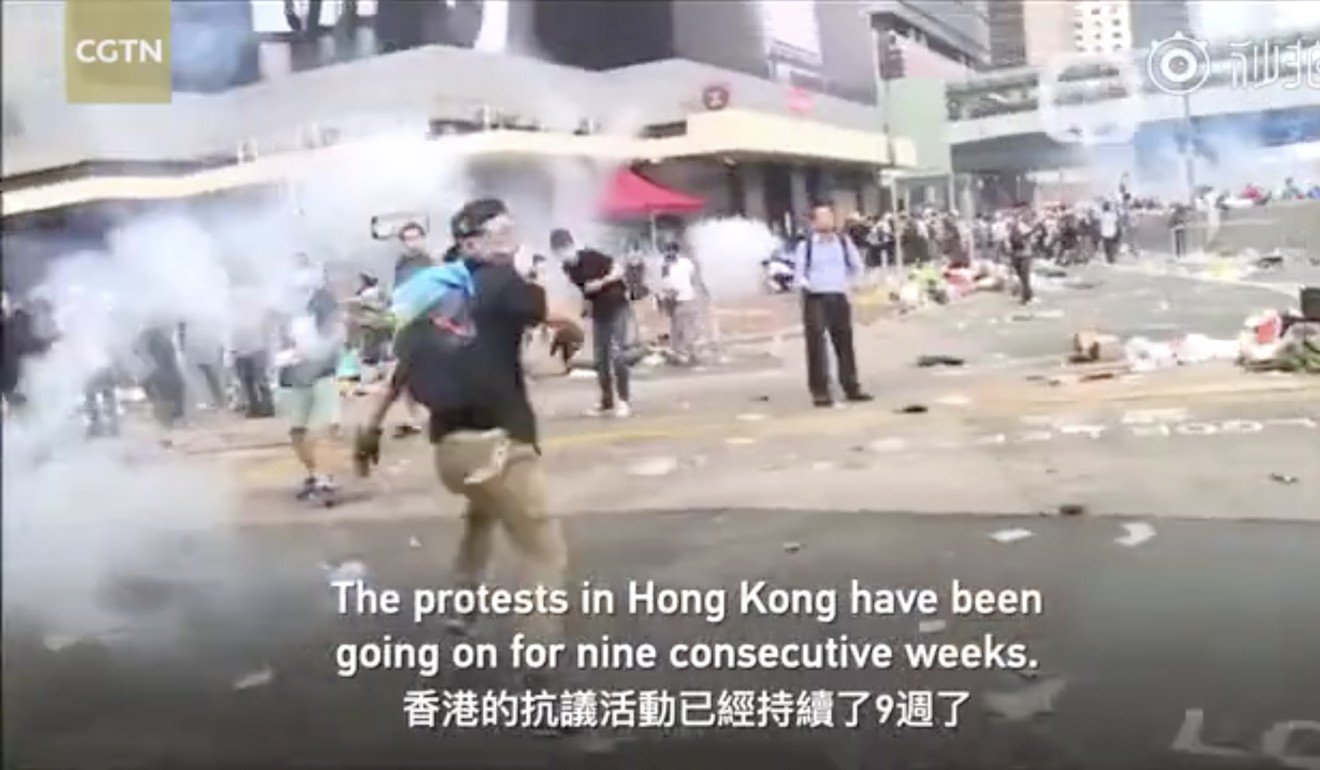- British regulator Ofcom investigating four broadcasts by CGTN aired in August and September
- Watchdog looking at whether Chinese programmes broke rules requiring news to be presented with due impartiality

Coverage of the Hong Kong protests by CGTN, the overseas arm of China’s state broadcaster, is being investigated by Ofcom, Britain’s communications regulator.
Britain’s communications regulator has launched an investigation into coverage of the Hong Kong protests by the overseas arm of Chinese state broadcaster China Global Television Network (CGTN).
“We are investigating whether these programmes broke our rules requiring news to be presented with due impartiality,” said an Ofcom spokesperson, referring to four separate broadcasts on Hong Kong’s anti-government protests that aired in Britain on three dates in August and one in September.
The investigation brings the total number of programmes from CGTN and its Beijing-based parent company China Central Television (CCTV) under investigation to eight, according to Ofcom documents.
Media reports have linked earlier investigations, launched in May, to complaints about the network’s airing of forced confessions made by detained Hong Kong bookseller Gui Minhai and British private investigator Peter Humphrey.
The programmes under investigation range in date from August 2013 to February 2018, according to Ofcom.
The latest investigation into the Hong Kong coverage comes as CGTN is set to open its London headquarters and is expanding its European footprint, part of China’s decade-long coordinated push to grow its overseas propaganda influence.
Overseas arms of China’s state propaganda have drawn criticism for coverage of the anti-government mass protests which have gripped Hong Kong and drawn global attention since the start of June, with most scrutiny focused around the networks’ social media presence.
The latest investigation into the Hong Kong coverage comes as CGTN is set to open its London headquarters and is expanding its European footprint, part of China’s decade-long coordinated push to grow its overseas propaganda influence.
Overseas arms of China’s state propaganda have drawn criticism for coverage of the anti-government mass protests which have gripped Hong Kong and drawn global attention since the start of June, with most scrutiny focused around the networks’ social media presence.
Social media giant Twitter moved to ban advertisements from state media on its platform last month, as reports emerged that China state propaganda used the paid promotions to call into question human rights abuses in East Turkestan and promote the central government’s view on the Hong Kong protests.
Broadcast media expert and lecturer in media and communication at Xian Jiaotong-Liverpool University Yik Chan Chin said that compliance with overseas media regulations was a burden for many of China’s outwardly mobile media companies.
“Impartiality is not part of the requirements for domestic media in China,” Chin said, noting there would likely exist a certain amount of autonomy for the overseas branches balanced with a need to follow central guidance “to an extent”.
“But if they take global expansion seriously, they need to be aware of the local regulations and comply with them,” she said, noting that Ofcom appeared to be increasing its scrutiny of the network, which had been broadcast as CCTV in Britain before being launched as a separate international arm in 2016.

A screengrab of some of CGTN’s coverage of the Hong Kong protests.
“It could be because the Hong Kong issue has been very prominent [in the news] and CGTN’s presence is becoming more prominent than before, so those are a couple of reasons that could have triggered the investigation,” she said.
CGTN is “shortly opening up” its London-based news office in Chiswick, originally slated for a 2018 opening, according to CGTN materials.
The London-based office is part of the CGTN mission to “provide 'objective', 'balanced', and 'impartial' news and current affairs content” while “reporting the news from a Chinese perspective”, according to CGTN Europe’s LinkedIn page.
CGTN and its British broadcasting licence-holder did not immediately respond to requests for comment.
Broadcast media expert and lecturer in media and communication at Xian Jiaotong-Liverpool University Yik Chan Chin said that compliance with overseas media regulations was a burden for many of China’s outwardly mobile media companies.
“Impartiality is not part of the requirements for domestic media in China,” Chin said, noting there would likely exist a certain amount of autonomy for the overseas branches balanced with a need to follow central guidance “to an extent”.
“But if they take global expansion seriously, they need to be aware of the local regulations and comply with them,” she said, noting that Ofcom appeared to be increasing its scrutiny of the network, which had been broadcast as CCTV in Britain before being launched as a separate international arm in 2016.

A screengrab of some of CGTN’s coverage of the Hong Kong protests.
“It could be because the Hong Kong issue has been very prominent [in the news] and CGTN’s presence is becoming more prominent than before, so those are a couple of reasons that could have triggered the investigation,” she said.
CGTN is “shortly opening up” its London-based news office in Chiswick, originally slated for a 2018 opening, according to CGTN materials.
The London-based office is part of the CGTN mission to “provide 'objective', 'balanced', and 'impartial' news and current affairs content” while “reporting the news from a Chinese perspective”, according to CGTN Europe’s LinkedIn page.
CGTN and its British broadcasting licence-holder did not immediately respond to requests for comment.
Aucun commentaire:
Enregistrer un commentaire